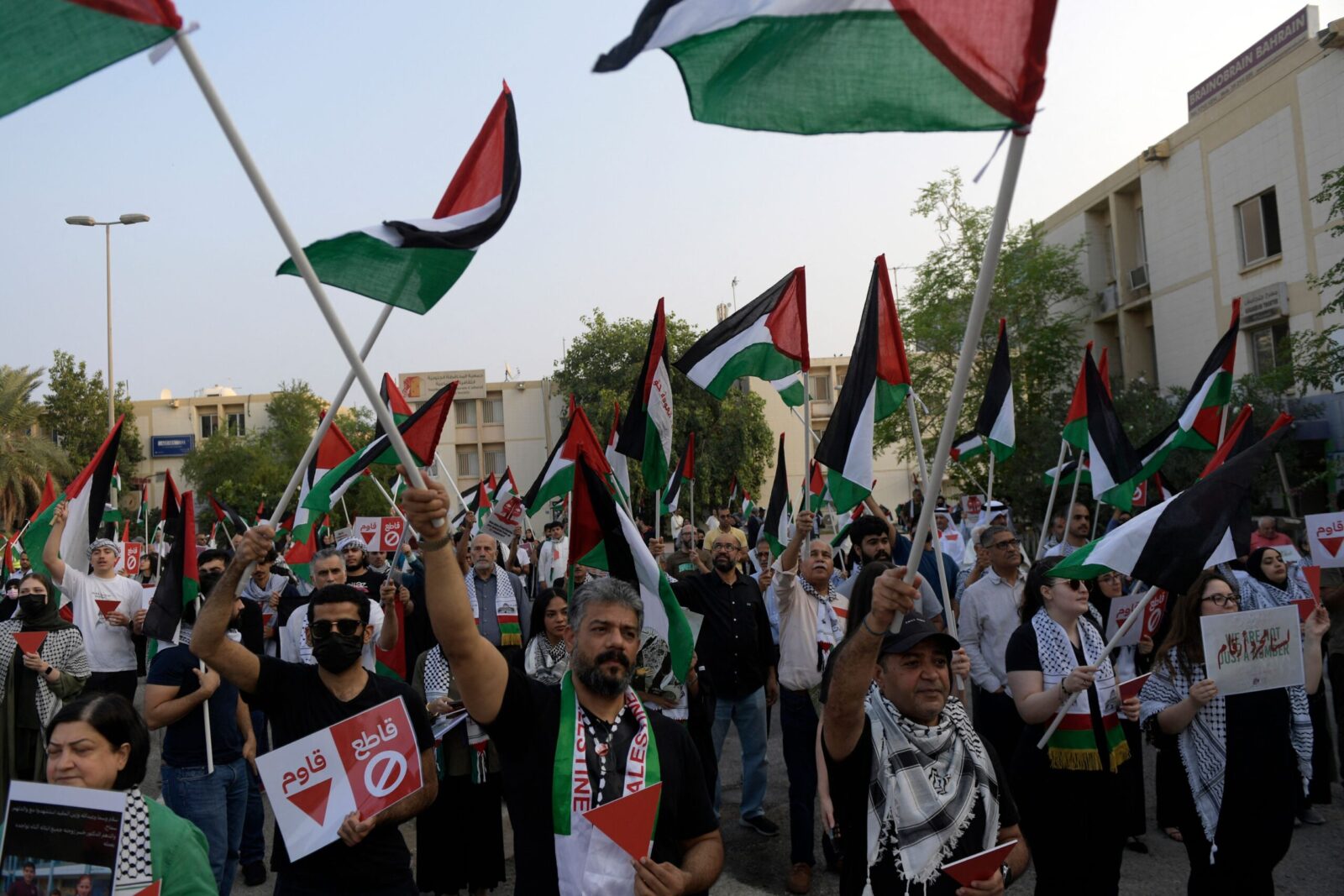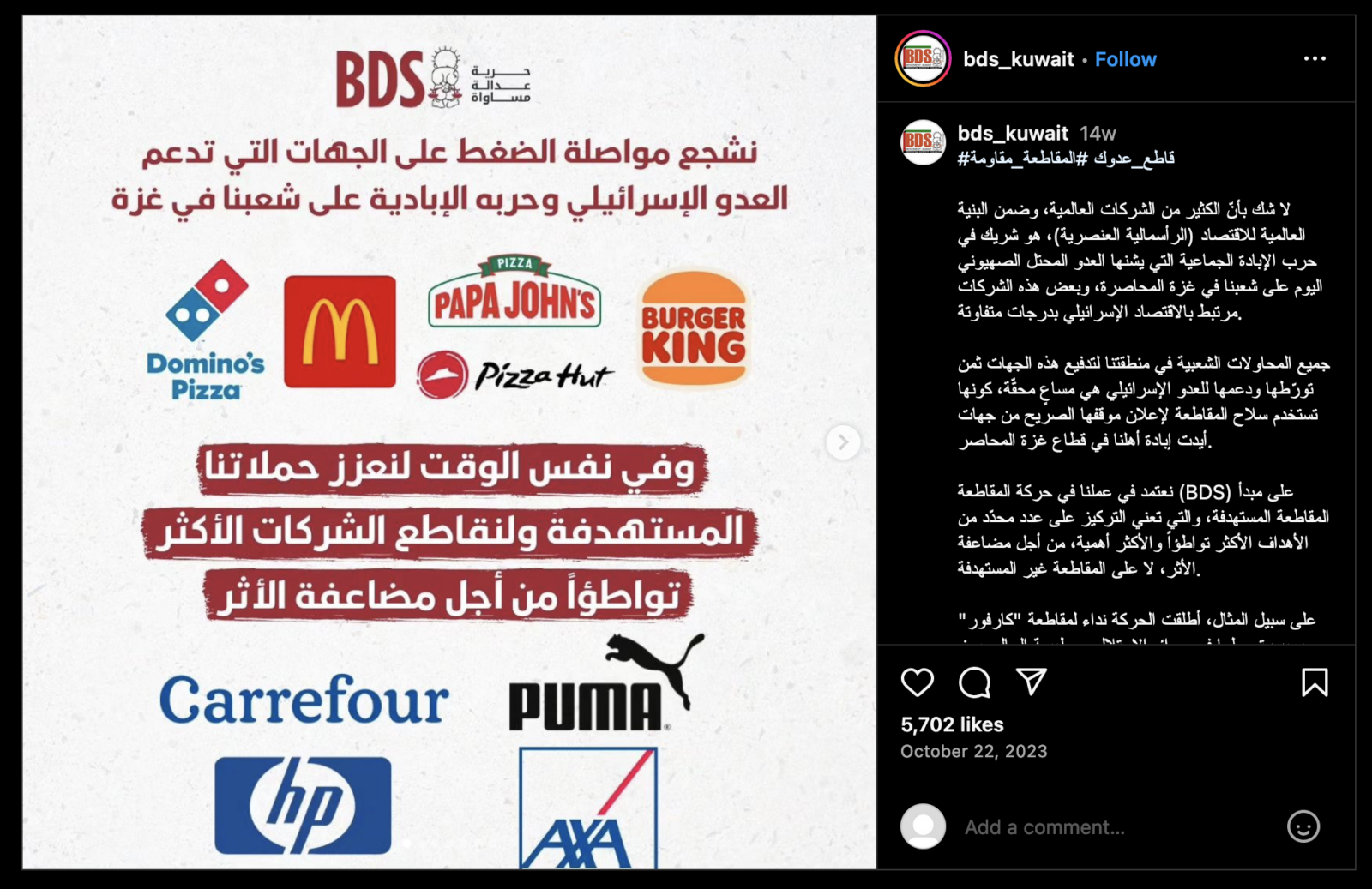
Protesters during a solidarity sit-in with the Gaza Strip, in Manama, Bahrain, on November 17, 2023. Mazen Mahdi/AFP via Getty Images
In 1973, members of the Organization of Arab Petroleum Exporting Countries (OAPEC) led an oil embargo against countries that supported Israel during the October War. Following the start of Israel’s genocidal war on Gaza, this history has also been invoked several times on Gulf Twitter (now X). On October 31, a commentator from Kuwait wrote, “10 Arab countries have oil, ten countries that have not yet agreed on a single word in favor of Gaza.”[1] On November 14, a resident of Qatar asked in a since deleted post, “Why are the Gulf countries not using oil and gas as a tool to stop the genocide in Palestine?” The uncomfortable laughter of the Saudi Oil Minister, Khalid al Falih, in response to a question on the use of oil as an economic tool was met on the website with declarations of shame and outrage.
There are certain essential characteristics of the oil weapon, however, that have been muted as they echoed across the short history between the October 1973 oil action and October 2023. The first is that workers from the oil industry were the instigators of past Gulf oil embargoes. For example, in 1956, during the British, French and Israeli Suez war against Egypt, a clandestine organization of oil workers known as the Kuwaiti Democratic League, took part in a call by the Movement of Arab Nationalists in Kuwait, and refused to load oil onto British and French tankers.
Third, European powers and the United States were more dependent on oil from Arab states in the 1970s than they are in 2023. Today, the nationalized oil companies of the Gulf are part of a “new hydrocarbon axis” in Asia, and most of their exports flow toward China, Japan, India and Singapore, among other states.[3] Finally, since the 1970s, counter-revolutionary regimes in the Gulf have effectively destroyed their workers’ movements and invested in the production of a precarious labor force made up of deportable non-citizens with poor working conditions and limited labor rights.

An Instagram post by BDS Kuwait calling on people in the region to use the “weapon of boycott” against global companies enabling Israel’s war on Gaza.
In today’s post-2011 and post-Abraham Accords Gulf, popular measures against Israel’s war in Gaza and its mounting violence across historic Palestine have centered largely around boycott. Anti-normalization groups in Bahrain and groups affiliated with the Boycott, Divestment, Sanctions (BDS) movement in Kuwait, Qatar and the Gulf in general have galvanized campaigns to boycott companies that support Israel or that profit from Palestinian oppression. Today’s popular boycotts include the targeted boycotts proposed by the BDS movement but extend beyond them. Households are changing their grocery purchases and suppliers. Information is being circulated across social media about companies that have established ties to Israel, following the 2021 normalization deals signed by Bahrain and the UAE. The website bdnaash allows users to type company names into a search engine to find out whether they are on the boycott list (the box turns red) or not (the box turns green).
In Bahrain, Kuwait, Oman and Qatar, authorities have granted permission for pro-Palestine and anti-war protests, and they have taken place. Some analysts speculate that large scale protests in Oman have forced its government to shift to a more critical stance in its political relations with the Israeli state. But overall, the response feels subdued. In Dubai and Bahrain, boycotts against Israel are carried out without being named as such for fear of repercussions. In Bahrain, political activist Ebrahim Sharif Al Sayed was detained for seven days, pending an investigation on the charge of “spreading false news during wartime.”[4] Human Rights Watch has documented the arrest and questioning in custody of more than 50 others, including minors, for participating in unlicensed protests, which have been taking place in Bahrain’s villages.
At the same time, authorities in a few Gulf states have instrumentalized a semblance of solidarity with Palestine. In the UAE, Sharjah banned its New Year’s eve celebrations in solidarity with Gaza. In Kuwait, two non-citizen nurses were also fired and deported for violating Kuwaiti law by expressing support for Israel. In the private sector, a hospital in Bahrain dismissed a non-citizen worker from his job for tweeting support for Israel’s war on Gaza. Incidentally, he was retweeting a Saudi influencer.
50 years after the oil embargo in 1973—and the national demonstrations and oil workers strikes of the two decades before—citizens in the Gulf seem to express political power largely through their consumption. The boycott itself is not new to the Gulf. Kuwaiti historian Talal Al Rashoud has written about a boycott office that opened in Kuwait in 1958 as a result of popular pressure to boycott Israel within the Customs Department. While there are many questions to be asked about the possibilities of its longevity, tactics and political potentials, for now, across the Gulf and beyond, many branches of McDonalds and Starbucks remain empty due to boycotts.
Those engaging in the boycott and local protests are part of a multi-faceted global movement in solidarity with Palestine. In various parts of the Gulf participants in solidarity actions with Palestine are also engaging in the local political scene, often chafing against the restrictions and imperatives of domestic powers. How these dynamics will play out in the long term remains to be seen.
[Samar Alwan, a pseudonym, is an activist and writer from the Gulf.]
Endnotes
[1] Post on X, October 31, 2023.
[2] Ahmad Al-Khatib, Al-Kuwait: Min al-Imara ila al-Dawla, Dhikrayat al-ʿAmal al-Watani wa-l-Qawmi (Kuwait, from Emirate to State: memories of Patriotic and National Action) (Casablanca: al-Markaz al- Thaqafi al-ʿArabi, 2007). Laleh Khalili, Sinews of War and Trade, Shipping and Capitalism in the Arabian Peninsula. (London: Verso: 2020).
[3] Hamza Hamouchene and Katie Sandwell, eds. Dismantling Green Colonialism: Energy and Climate Justice in the Arab Region (Pluto Press, 2023), p. 19.
[4] “Bahrain arrests activist for criticising Red Sea Taskforce,” The New Arab, December 21, 2023.
